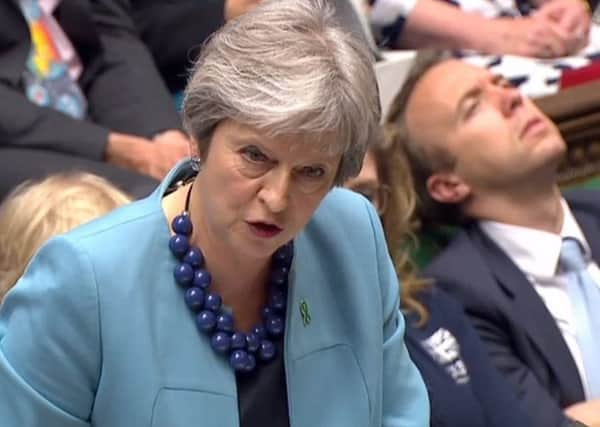Paris Gourtsoyannis: Brexit mutineers keep their powder dry


Over the next two days and 12 hours of debate on a list of 15 Lords amendments to the EU Withdrawal Bill, we will get to see just how far Brexit has led British politics away from that basic principle.
There will be rhetoric and accusations flung across the Commons by opposing sides. But for both parties, the real debate over this crucial piece of Brexit legislation has become a private affair, hermetically sealed to prevent contamination from one side to the other.
Advertisement
Hide AdAdvertisement
Hide AdThe outcomes of this week’s votes are likely to fit the contours of this airtight seal. Trapped in a vacuum, it’s the democratic process that’s suffocating.
On the Conservative benches, it’s the Conservative Euro-sympathisers who should be calling the shots. They dwarf the government’s working majority, which only exists thanks to the support of the DUP.
But for all the banner headlines about mutineers defying the will of the people, the likelihood of fireworks today and tomorrow has dwindled. Amber Rudd, who it was hoped would lead the rebellion from the backbenches, instead issued an appeal for loyalty alongside none other the Iain Duncan Smith. Theresa May now looks likely to get her way on most, if not all of the amendments imposed by meddling peers.
Why? Because pro-EU Tory rebels know they don’t have to fear Labour - more on that later - so they’re more worried about other pro-Brexit Tory rebels. Mutineers have traded their ammunition for assurances from whips and ministers that customs and trade legislation will be brought forward before Brexit day. Those assurances are useless if May is deposed, so its in the interests of would-be rebels to keep her in place, where they can negotiate her into a corner.
They now see their main job as preventing the growing prospect of a no-deal Brexit, which means pushing the government to get a deal, and then getting that deal through parliament. One of them told me they believe as many as seven Conservative Brexiteers could vote against any terms brought back from Brussels, in favour of an ideologically-driven cliff-edge Brexit. “It’s getting to the point where it doesn’t matter what’s in the exit agreement,” they said. With negotiations in Brussels going so badly, any deal would be better than no deal.
On the other side of the Commons, Labour mutineers are even stronger in number, and they are not giving up. They’ve already forced Jeremy Corbyn, a natural eurosceptic, to give way on supporting a customs deal after Brexit, and at the weekend Keir Starmer - their mole in Labour HQ - went further than ever before, talking about the need for a “single market deal”.
They won’t get Labour front bench support for their kite-flying amendment on UK membership of the European Economic Area, but with every pronouncement from Starmer, the chances of Labour supporting the final Brexit deal grow dimmer. That wasn’t clear in the months after the EU referendum, and despite their public frustrating with their own leadership, pro-EU MPs have reason to celebrate the campaign they’ve waged in parliament, and with the support of unions outside it.
The problem for Labour rebels is what happens next. It isn’t easy to envisage any Brexit scenario that puts a pro-EU party with a eurosceptic leader into power.
Advertisement
Hide AdAdvertisement
Hide AdA collapse in Brexit talks would likely usher May out of Downing Street, but it would be Michael Gove or Boris Johnson who would be odds-on to succeed her. Under any circumstances, the Tories won’t go back to the country unless they absolutely have to.
The deadlock means that for now, we’re likely to see a series of knife-edge votes on the 14 Lords amendments the government wants to dispense with - but despite the government’s weakness, a defeat may be out of reach. Mutineers will want to keep their power dry for another battle in a campaign that has a few months more to run.